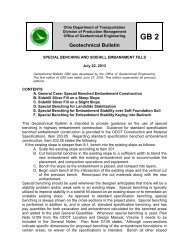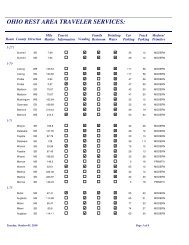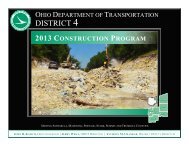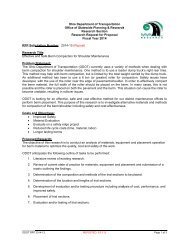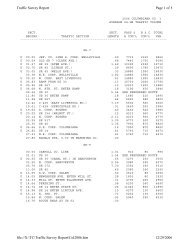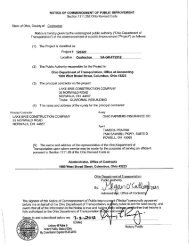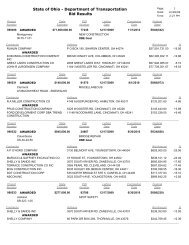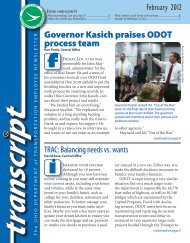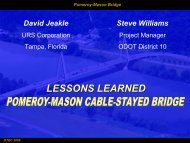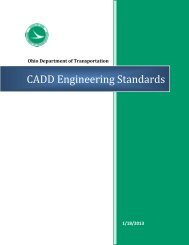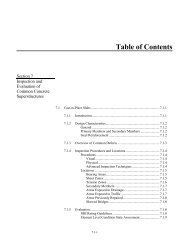Final Report - Ohio Department of Transportation
Final Report - Ohio Department of Transportation
Final Report - Ohio Department of Transportation
You also want an ePaper? Increase the reach of your titles
YUMPU automatically turns print PDFs into web optimized ePapers that Google loves.
implementing the tests for which ODOT already has an inventory <strong>of</strong> results with which the new<br />
data can be compared.<br />
1.7 Fundamental Problem and Research Approach<br />
Urban yard waste poses solid management difficulties for many communities. In many areas,<br />
municipal solid waste is disposed <strong>of</strong> in sanitary landfills. However, the U.S. Environmental<br />
Protection Agency strongly discourages this practice and many state, county, and municipal<br />
authorities have enacted rules that mandate some other form <strong>of</strong> disposal. Often communities<br />
must collect and dispose <strong>of</strong> yard waste separately, and with ever-increasing personnel, equipment<br />
and fuel costs, separate yard waste collection is an increasing financial burden. Furthermore,<br />
there are few waste management alternatives for yard waste. Most communities compost yard<br />
waste but this is not an ideal solution:<br />
i. Composting takes time (months to years), energy, and a large amount <strong>of</strong> space.<br />
ii. Yard waste compost is not in high demand as a consumer product.<br />
iii. Yard waste composting can lead to aesthetic problems such as odor.<br />
iv. Yard waste composting can lead to concerns about the distribution <strong>of</strong> plant and<br />
animal pathogens that may not be deactivated in compost piles.<br />
v. Yard waste composting does not destroy the residuals <strong>of</strong> yard care chemicals such as<br />
pesticides and herbicides.<br />
vi. Composting yard waste releases all <strong>of</strong> the CO2 potential <strong>of</strong> this organic waste.<br />
A project has been initiated at CWRU to evaluate an alternative method <strong>of</strong> managing yard<br />
waste. Research is evaluating the potential <strong>of</strong> managing yard waste by carbonization. This <strong>of</strong>fers<br />
the possibility <strong>of</strong> allowing for co-collection <strong>of</strong> yard waste with conventional solid waste (i.e. in<br />
one truck instead <strong>of</strong> two), yard waste management at landfill sites rather than at separate<br />
composting facilities, production <strong>of</strong> soil amendment products that permanently sequester CO2<br />
(carbon added to soil has been shown to increase crop productivity) and the production <strong>of</strong><br />
valuable byproducts during the carbonization process.<br />
The research project described here was formulated specifically to examine the possibility<br />
<strong>of</strong> recovering bioasphalt bitumen from yard waste carbonization processes. This will produce a<br />
non-petroleum-based product <strong>of</strong> value to the transportation industry that results from a “carbon<br />
17



